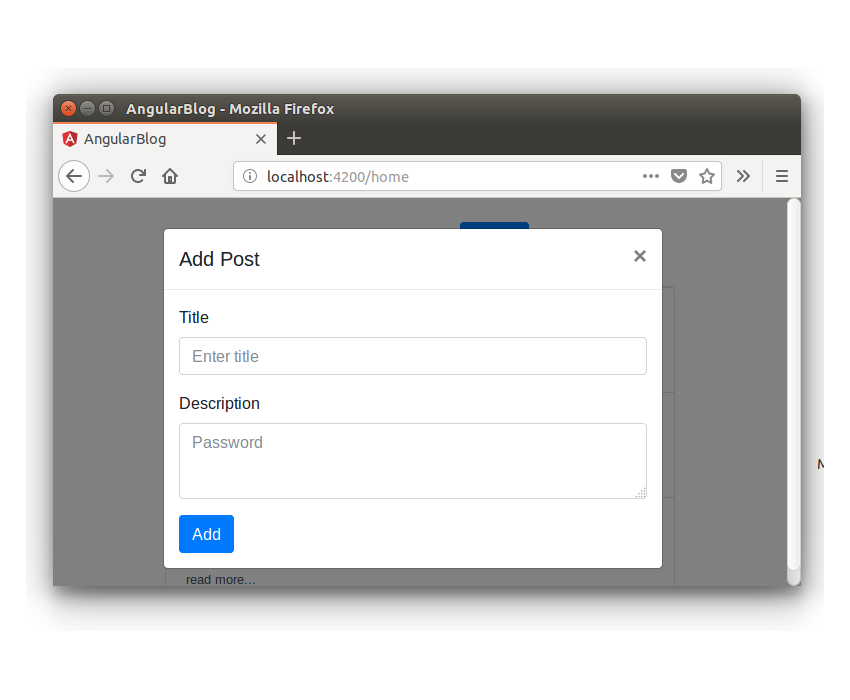在 Angular 部落格教學系列的上一部分中,您學習如何建立 ShowPostComponent 以在主頁上顯示部落格文章清單。您使用建立的 REST API 端點取得了從 MongoDB shell 插入的記錄。
在本教程中,您將建立一個名為 AddPostComponent 的新元件,以提供向 MongoDB 資料庫新增部落格文章的使用者介面。
讓我們開始複製本教學系列前一部分的原始程式碼。
git clone https://github.com/royagasthyan/ShowPost AddPost
導航到專案目錄並安裝所需的依賴項。
cd AddPost/client npm install cd AddPost/server npm install
安裝依賴項後,重新啟動客戶端和伺服器應用程式。
cd AddPost/client npm start cd AddPost/server node app.js
將瀏覽器指向 http://localhost:4200,應用程式應該正在執行。
讓我們開始建立 AddPostComponent。在 src/app 資料夾中建立一個名為 add-post 的資料夾。在 add-post 資料夾中,建立一個名為 add-post.component.ts 的檔案並加入以下程式碼:
import { Component } from '@angular/core';
import { Post } from '../models/post.model';
@Component({
selector: 'app-add-post',
templateUrl: './add-post.component.html',
styleUrls: ['./add-post.component.css']
})
export class AddPostComponent {
constructor() {
}
}
建立一個名為 add-post.component.html 的檔案和以下 HTML 程式碼:
<div class="modal fade" id="exampleModal" tabindex="-1" role="dialog" aria-labelledby="exampleModalLabel" aria-hidden="true">
<div class="modal-dialog" role="document">
<div class="modal-content">
<div class="modal-header">
<h5 class="modal-title" id="exampleModalLabel">Modal title</h5>
<button type="button" #closeBtn class="close" data-dismiss="modal" aria-label="Close">
<span aria-hidden="true">×</span>
</button>
</div>
<div class="modal-body">
<form>
<div class="form-group">
<label for="exampleInputEmail1">Title</label>
<input name="title" type="text" class="form-control" id="exampleInputEmail1" aria-describedby="emailHelp" placeholder="Enter title">
</div>
<div class="form-group">
<label for="exampleInputPassword1">Description</label>
<textarea name="description" class="form-control" id="exampleInputPassword1" placeholder="Password">
</textarea>
</div>
<button type="button" class="btn btn-primary">Add</button>
</form>
</div>
</div>
</div>
</div>
您將以彈出視窗的形式顯示新增貼文元件。
現在您需要將 AddPostComponent 新增到 NgModule。在 app.module.ts 檔案中導入 AddPostComponent。
import { AddPostComponent } from './add-post/add-post.component';
將該元件新增至 NgModule declarations 清單。其外觀如下:
import { BrowserModule } from '@angular/platform-browser';
import { NgModule } from '@angular/core';
import { ROUTING } from './app.routing';
import { FormsModule } from '@angular/forms';
import { HttpClientModule } from '@angular/common/http';
import { RootComponent } from './root/root.component';
import { LoginComponent } from './login/login.component';
import { HomeComponent } from './home/home.component';
import { ShowPostComponent } from './show-post/show-post.component';
import { AddPostComponent } from './add-post/add-post.component';
@NgModule({
declarations: [
RootComponent,
LoginComponent,
HomeComponent,
ShowPostComponent,
AddPostComponent
],
imports: [
BrowserModule,
ROUTING,
FormsModule,
HttpClientModule
],
providers: [],
bootstrap: [RootComponent]
})
export class AppModule { }
要觸發新增貼文彈出窗口,您已經將 data-target 屬性新增到 home.component.html 中的按鈕。
<button type="button" class="btn btn-link" data-toggle="modal" data-target="#exampleModal"> Add </button>
儲存上述變更並重新啟動應用程式。登入應用程式並點擊主頁中的新增連結。您將看到 AddPostComponent 顯示為彈出視窗。

將 ngModel 指令加入到 title 和 description 的輸入元素。
<input name="title" type="text" [(ngModel)]="post.title" class="form-control" id="exampleInputEmail1" aria-describedby="emailHelp" placeholder="Enter title"> <textarea name="description" [(ngModel)]="post.description" class="form-control" id="exampleInputPassword1" placeholder="Password"> </textarea>
在按鈕中新增 click 指令,用來呼叫儲存博文的方法。
<button (click)="addPost()" type="button" class="btn btn-primary">Add</button>
從 add-post.component.ts 檔案中的 src/app/models/post.model.ts 匯入 Post 模型.
import { Post } from '../models/post.model';
在 add-post.component.ts 檔案中定義 post 變數。
public post : Post;
在 add-post.component.ts 檔案中定義 addPost 方法。在 addPost 方法中,您將驗證輸入的 title 和 description 並呼叫服務方法以呼叫 REST API。方法如下所示:
addPost() {
if(this.post.title && this.post.description){
// call the service method to add post
} else {
alert('Title and Description required');
}
}
讓我們為元件 AddPostComponent 建立服務文件。建立一個名為 add-post.service.ts 的檔案並新增以下程式碼:
import { Injectable } from '@angular/core';
import { HttpClient } from '@angular/common/http';
import { Post } from '../models/post.model';
@Injectable()
export class AddPostService {
constructor(private http: HttpClient){
}
}
在 AddPostService 內,建立一個名為 addPost 的方法來進行 REST API 呼叫。
addPost(post: Post){
return this.http.post('/api/post/createPost',{
title : post.title,
description : post.description
})
}
如上面的程式碼所示,您使用了 HttpClient 來進行 API 呼叫並傳回 Observable。
在add-post.component.ts 檔案內的addPost 方法中,您將從addPost 方法class="inline"> add-post.service.ts 檔案。
this.addPostService.addPost(this.post).subscribe(res =>{
// response from REST API call
});
以下是 add-post.component.ts 檔案的外觀:
import { Component } from '@angular/core';
import { AddPostService } from './add-post.service';
import { Post } from '../models/post.model';
@Component({
selector: 'app-add-post',
templateUrl: './add-post.component.html',
styleUrls: ['./add-post.component.css'],
providers: [ AddPostService ]
})
export class AddPostComponent {
public post : Post;
constructor(private addPostService: AddPostService) {
this.post = new Post();
}
addPost() {
if(this.post.title && this.post.description){
this.addPostService.addPost(this.post).subscribe(res =>{
console.log('response is ', res)
});
} else {
alert('Title and Description required');
}
}
}
讓我們建立一個 REST API 端點,用於將部落格文章新增到 MongoDB 資料庫。在 server/app.js 檔案中,建立一個 API 端點,如下所示:
app.post('/api/post/createPost', (req, res) => {
// insert the details to MongoDB
})
首先,您需要使用 Mongoose 用戶端連接到 MongoDB 資料庫。
mongoose.connect(url, { useMongoClient: true }, function(err){
if(err) throw err;
console.log('connection established ');
});
建立連線後,您需要使用 Post 架構(在 server/model/post.js 檔案中定義)建立模型物件。
const post = new Post({
title: req.body.title,
description: req.body.description
})
如上面的程式碼所示,您使用從請求 req 物件傳入的 title 和 description 建立了 Post 物件。 < /p>
在 Post 物件上呼叫 save 方法將項目儲存到 MongoDB。
post.save((err, doc) => {
if(err) throw err;
return res.status(200).json({
status: 'success',
data: doc
})
})
如上面的代码所示,一旦调用 save 方法回调且没有错误,它将返回 success 消息以及返回的对象 doc。
以下是 REST API 端点的最终外观:
app.post('/api/post/createPost', (req, res) => {
mongoose.connect(url, { useMongoClient: true }, function(err){
if(err) throw err;
const post = new Post({
title: req.body.title,
description: req.body.description
})
post.save((err, doc) => {
if(err) throw err;
return res.status(200).json({
status: 'success',
data: doc
})
})
});
})
保存上述更改并重新启动 Angular 和 Node 服务器。登录应用程序并尝试添加新的博客文章。单击添加按钮后,检查浏览器控制台,您将记录成功响应。
当博客文章详细信息成功添加到数据库后,您需要关闭弹出窗口。为了关闭弹出窗口,您需要以编程方式单击一个关闭按钮。
您将使用 @ViewChild 装饰器来访问关闭按钮。
在 AddPostComponent 中导入 ViewChild 和 ElementRef。
import { Component, ViewChild, ElementRef } from '@angular/core';
在 AddPostComponent 内,定义以下变量:
@ViewChild('closeBtn') closeBtn: ElementRef;
使用以下代码启动 closeBtn 单击:
this.closeBtn.nativeElement.click();
将上述代码添加到addPost方法的成功回调中。这是 addPost 方法,来自 add-post.component.ts。
addPost() {
if(this.post.title && this.post.description){
this.addPostService.addPost(this.post).subscribe(res =>{
this.closeBtn.nativeElement.click();
});
} else {
alert('Title and Description required');
}
}
保存更改并重新启动客户端服务器。登录应用程序并尝试添加新的博客文章。成功保存博客文章详细信息后,弹出窗口将关闭。
需要注意的一件事是,新添加的博客文章不会显示在博客文章列表中。所以需要添加一个触发器来通知何时更新ShowPostComponent。您将使用通用服务在两个组件之间进行通信。
在 src/app 文件夹中创建一个名为 service 的文件夹。使用以下代码创建一个名为 common.service.ts 的文件:
import { Injectable } from '@angular/core';
import { Subject } from 'rxjs/Subject';
@Injectable()
export class CommonService {
public postAdded_Observable = new Subject();
constructor(){
}
notifyPostAddition(){
this.postAdded_Observable.next();
}
}
如上面的代码所示,您已声明一个名为 postAdded_Observable 的 Subject 来跟踪添加到数据库中的新博客文章。每当新的博客文章添加到数据库时,您将调用 notifyPostAddition 方法,该方法将通知订阅者有关更新的信息。
在 app.module.ts 中导入 CommonService 并将其包含在 NgModule 提供商列表中。其外观如下:
import { BrowserModule } from '@angular/platform-browser';
import { NgModule } from '@angular/core';
import { ROUTING } from './app.routing';
import { FormsModule } from '@angular/forms';
import { HttpClientModule } from '@angular/common/http';
import { RootComponent } from './root/root.component';
import { LoginComponent } from './login/login.component';
import { HomeComponent } from './home/home.component';
import { ShowPostComponent } from './show-post/show-post.component';
import { AddPostComponent } from './add-post/add-post.component';
import { CommonService } from './service/common.service';
@NgModule({
declarations: [
RootComponent,
LoginComponent,
HomeComponent,
ShowPostComponent,
AddPostComponent
],
imports: [
BrowserModule,
ROUTING,
FormsModule,
HttpClientModule
],
providers: [CommonService],
bootstrap: [RootComponent]
})
export class AppModule { }
在 show-post.component.ts 文件中导入 CommonService 并在构造方法中初始化。
import { CommonService } from '../service/common.service';
constructor(private showPostService: ShowPostService, private commonService: CommonService) {
}
在 ngOnInit 方法内,订阅 postAdded_Observable 变量并加载 getAllPost 方法。以下是 ngOnInit 方法的外观:
ngOnInit(){
this.getAllPost();
this.commonService.postAdded_Observable.subscribe(res => {
this.getAllPost();
});
}
在 add-post.component.ts 文件中导入 CommonService,并在添加博客文章后调用 notifyPostAddition 方法。以下是 AddPostComponent 中的 addPost 方法的外观:
addPost() {
if(this.post.title && this.post.description){
this.addPostService.addPost(this.post).subscribe(res =>{
this.closeBtn.nativeElement.click();
this.commonService.notifyPostAddition();
});
} else {
alert('Title and Description required');
}
}
保存以上更改并重新启动客户端服务器。登录到应用程序并添加新的博客文章。添加后,博客文章列表将更新为新的博客文章。
在本教程中,您创建了 AddPostComponent 以将博客文章详细信息添加到 MongoDB 数据库。您使用 Mongoose 客户端创建了 REST API,用于将博客文章保存到 MongoDB 数据库。
在本系列的下一部分中,您将实现编辑和更新博客文章详细信息的功能。
本教程的源代码可在 GitHub 上获取。
到目前为止您的体验如何?请在下面的评论中告诉我您的宝贵建议。
以上是Angular 和 MongoDB:向部落格應用程式添加帖子的詳細內容。更多資訊請關注PHP中文網其他相關文章!




